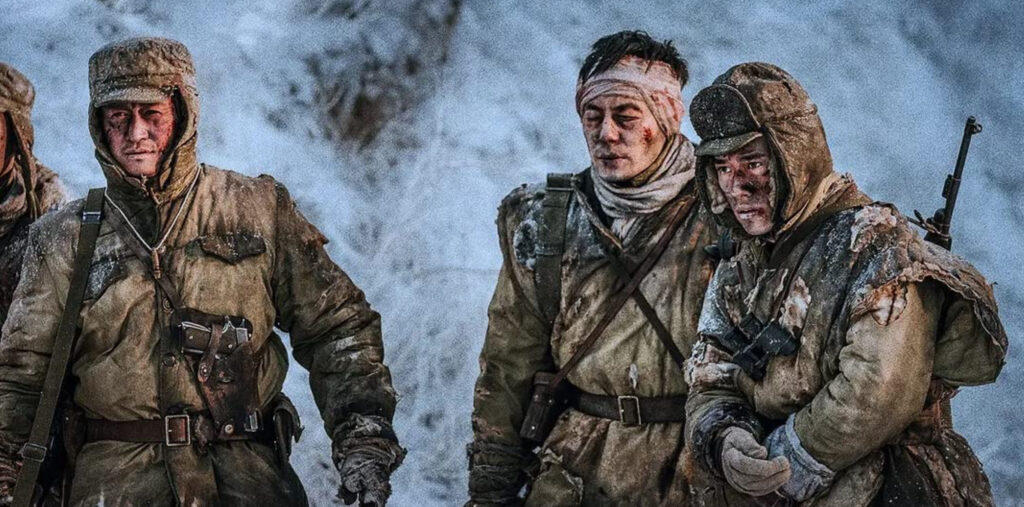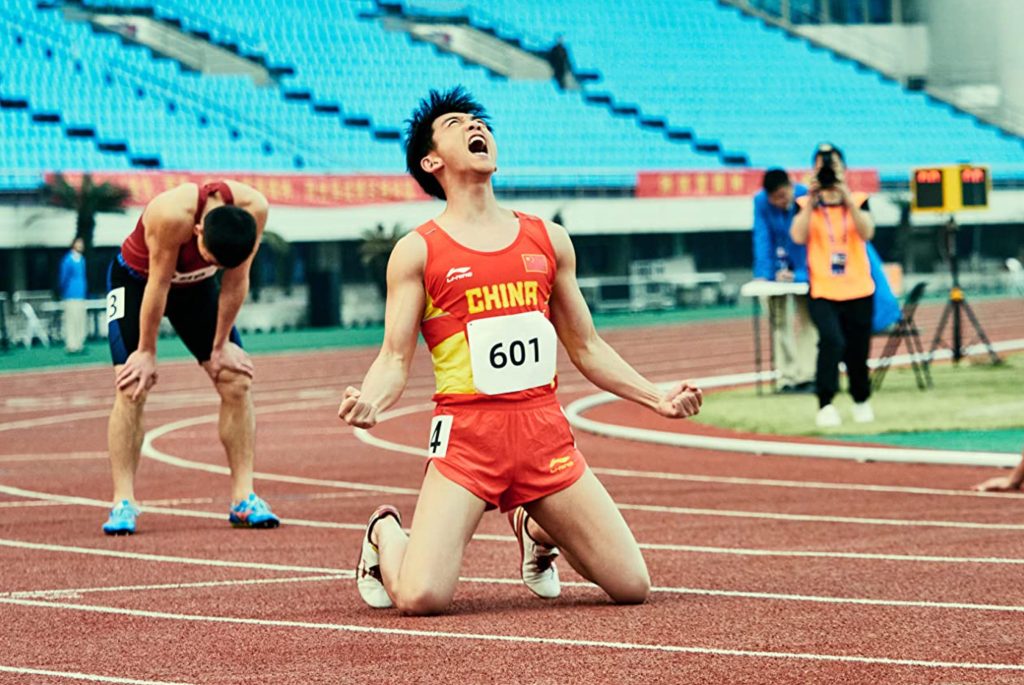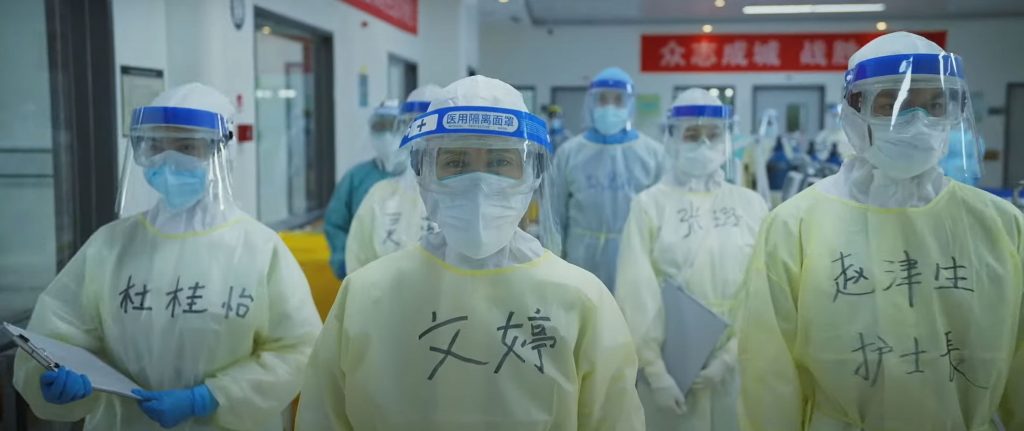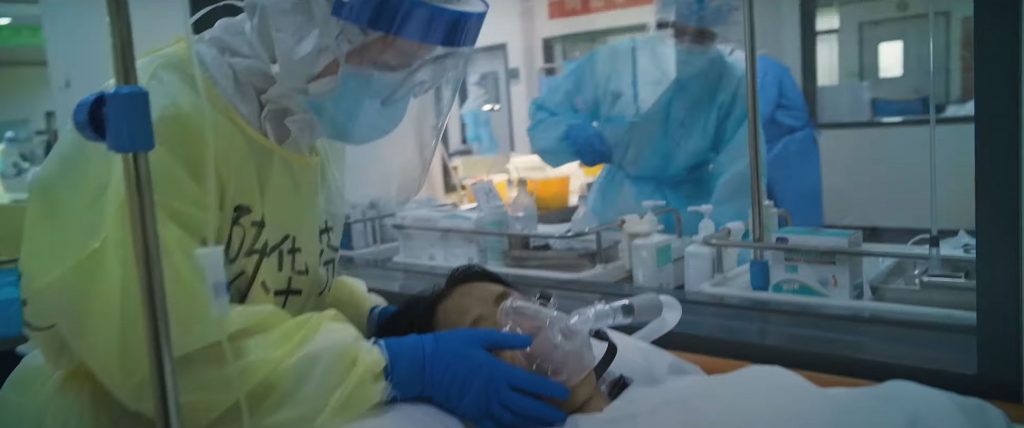April 24, 2022
by Carla Hay

“The Battle at Lake Changjin II”
Directed by Chen Kaige, Tsui Hark and Dante Lam
Mandarin, Korean and English with subtitles
Culture Representation: Taking place in Korea, China, Japan and the United States, in December 1950, the action film “The Battle at Lake Changjin II” features a mostly Asian cast of characters (with some white people) representing military people and politicians involved in the Korean War.
Culture Clash: Two bickering brothers, who are in the China-based People’s Liberation Army, have various battles with each other and military enemies during the Korean War against the United States.
Culture Audience: “The Battle at Lake Changjin II” will appeal primarily to people who are interested in violent war movies with amateurish dialogue and stereotypical characters that don’t have much that’s interesting to say.

“The Battle at Lake Changjin II” should have the more accurate title of “The Battle at Lake Changjin: The Deleted Scenes.” That’s because this cash-grab war movie isn’t a true sequel but just a series of scenes that could’ve been in the first movie. And the first movie wasn’t even that great in the first place. And even though “The Battle at Lake Changjin” (which is nearly three hours long) and its sequel “The Battle at Lake Changjin II” (which has a total running time of about two-and-half-hours) are both over-indulgent messes, just because “The Battle at Lake Changjin II” has a shorter time length doesn’t make it better than its predecessor. “The Battle at Lake Changjin II” is worse.
“The Battle at Lake Changjin II” has a nearly identical storyline as its predecessor, because the movie has the same production team as 2021’s “The Battle at Lake Changjin.” Chen Kaige, Tsui Hark and Dante Lam directed both movies, while both screenplays were written by Lan Xiaolong and Huang Jianxin. In both movies, the Chinese military group People’s Liberation Army fights against the U.S. military during the Korean War’s Battle at the Chosin Reservoir.
The Army’s 7th Company is led by a courageous and respected commander Wu Qianli (played by Wu Jing), who has a 19-year-old brother named Wu Wanli (played by Jackson Yee) in the company. Wanli enlisted in the Army against Qianli’s wishes. Also returning from the original “Battle at Lake Changjin” movie are the 7th Company’s political instructor Mei Sheng (played by Zhu Yawen), fire platoon leader Yu Congrong (payed by Li Chen), artillery platoon leader Lei Suisheng (played by Hu Jun) and sniper Ping He (played by Elvis Han). Because this is a war movie, not everyone makes it out alive.
And once again, the chief villains of the story are U.S. Marines Major General Oliver P. Smith (played by John F. Cruz) and U.S. Army Commander Douglas MacArthur (played by James Filbird). “The Battle at Lake Changjin II” adds some more American leaders who weren’t in the “The Battle at Lake Changjin.” U.S. president Harry Truman (played by Ben Z Orenstein) appears briefly in a few scenes. Truman, who is depicted as someone who tried to reign in MacArthur, utters this line in one of the scenes: “MacArthur needs to be reminded that no man is bigger than this war.” Lieutenant Colonial Wilber Colbert (played by Steven John Venn) is a stereotype of a ruthless American military leader who thinks Americans are better than anyone else.
This inferior sequel does a few things differently with the characters in the movie, compared to “The Battle at Lake Changjin.” A wounded 7th Company battalion commander named Yang Wenjang (played by Geng Le) gets a little bit of a backstory. Wenjang has a flashback to his life before he was in the war, when he’s seen with his girlfriend. But that barely counts as character development, which is mostly non-existent in this movie.
“The Battle at Lake Changjin II” (also titled “Water Gate Bridge”) has even more over-the-top battle scenes than in “The Battle at Lake Changjin.” Some of the Chinese soldiers almost seem to have superhuman powers, based on the way they can do eye-popping leaps and kicks in the air, where they look like action stuntmen, not realistic soldiers. And sometimes, they’re literally on fire doing it, as there’s more than one sequence where soldiers who are burning up in flames still get things done.
Even though “The Battle at Lake Changjin” and “The Battle at Lake Changjin II” (which were both filmed during the same time period) are among the most expensively produced movies in China’s history, many of the visual effects look cheap and tacky, and the stunts often look sloppy. “The Battle at Lake Changjin II” is even more incoherent than its predecessor.
It isn’t until the last 15 minutes of this three-hour schlockfest that “The Battle at Lake Changjin II” tries to bring some grief-stricken humanity to the story, to show the realistic emotional traumas of war. But by then, it’s too little, too late. The last scene in the movie is overly sentimental and looks very forced, because the sappy tone is very off-balance from the rest of the callous violence film. This final scene looks like it belongs in a completely different movie but was dropped in “The Battle at Lake Changjin II” as a manipulative attempt to get viewers to cry.
The directors of “The Battle at Lake Changjin” movies have said that it’s possible that a six-hour directors’ cut could be released. Two to three hours of watching one of these films is more than enough time wasted. If you just want to turn your brain off and watch shootouts and explosions with mindless dialogue and forgettable characters, then “The Battle at Lake Changjin” movies are for you. If you care about watching more meaningful and authentic movies about real-life wars, your time is better spent on any number of higher-quality choices.
CMC Pictures released “The Battle at Lake Changjin II” in select U.S. cinemas on February 11, 2022. The movie was released in China on February 1, 2022.






